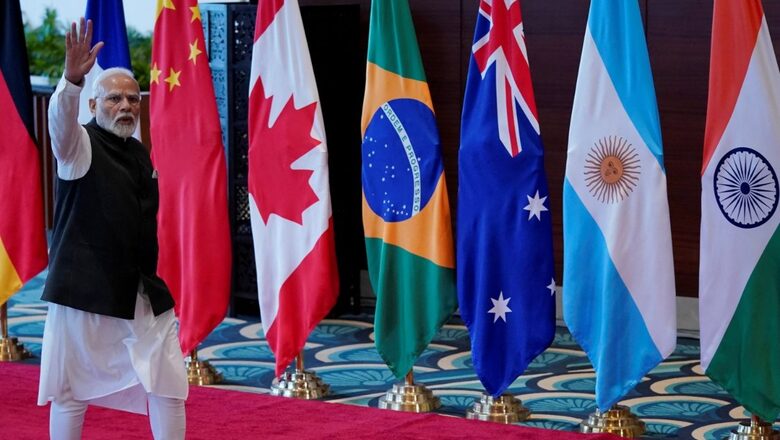
views
Prime Minister Narendra Modi started rewriting the rules even before he took the oath on May 26, 2014. As prime minister-elect, he invited the heads of the governments of all South Asian states. Foreign envoys working in New Delhi had attended swearing-in ceremonies in the past, but no world leader had been invited to the ceremony, which until 2014 was seen as a domestic event.
First, the heads of state of Afghanistan, Bangladesh, Bhutan, the Maldives, Nepal, Pakistan, and Sri Lanka were invited to the oath-taking ceremony at Rashtrapati Bhawan. Despite speculation, the then Pakistan Prime Minister Nawaz Sharif attended the event. Today, nations turn to Bharat for help during crises, for advice, and more. Bharat has truly redefined foreign diplomacy, and PM Modi has big plans.
Bharat’s political, strategic, cultural, and economic relations with most of its neighbours have shown considerable improvement under the ‘Neighbourhood First’ policy espoused by PM Modi at the beginning of his first tenure. Since 2014, Bharat has made substantial investments in resources and projects to enhance its capabilities in the realm of soft power diplomacy.
The G20 Summit, hosted by Bharat, will forever be remembered as one of the most important events in the modern history of contemporary times. Today, the world is Bharat’s oyster. Over the last nine years, Bharat has taken several far-reaching initiatives, both domestically and globally, that have significantly enhanced its clout and prestige in the world. The bold, courageous, and visionary leadership of peripatetic PM Modi has helped Bharat deftly navigate the myriad challenges confronting it and effectively leverage the huge opportunities available to promote Bharat’s political, security, strategic, and economic interests.
Bharat is now a key actor in this new global landscape, not only for the money it has been contributing but also for its influence in shaping future global development conversations and forging new alliances.
Under the tutelage of PM Modi, Bharat has been responding to emergencies either by providing funds or sending supplies to affected countries. This assistance has included support in response to natural disasters, engagement in humanitarian response during long-term complex emergencies, and support provided in post-conflict, post-disaster, and pandemic situations. Bharat’s overseas development assistance has indeed been an important part of Indian foreign policy.
The past nine years have seen substantial increases in Indian bilateral aid, and with this expansion has come increased support for international humanitarian response. Providing development assistance to any other country is often seen as a step forward in terms of a country’s political and economic standing in the global hierarchy. The development and production of COVID-19 vaccines in Bharat and their export highlighted our position as a responsible and reliable stakeholder in global health supply chains and as a responsible global citizen.
Bharat has been sharing its developmental experiences and technical expertise with other countries in the spirit of ‘Vasudhaiva Kutumbakam’. Bharat’s approach to development is mainly human-centric and marked by respect, diversity, care for the future, and sustainable development. Bharat’s interactions with countries like the USA, Japan, China, UK, Germany, France, Russia, the Republic of Korea, UAE, Malaysia, and Singapore have focused on giving shape to the government’s ‘Make in India’ programme by showcasing a favourable investment climate being created in Bharat. This proactive outreach has already shown a significant increase in foreign direct investment (FDI) inflows.
The crisis in Ukraine was one of the key strategic challenges in 2022. The hostilities put the Indian community of over 20,000 in direct danger, a substantial majority of whom were young Indian students. The evacuation and repatriation exercise, Operation Ganga, was beset with many logistical challenges. Operation Ganga involved a ‘whole of government’ approach, with PM Modi chairing review meetings almost daily. This exercise involved multi-layered, inter-agency cooperation where the Ministry worked with the Ministry of Civil Aviation, the Ministry of Defence, the National Disaster Response Force, state governments, and the private sector.
PM Modi has redefined foreign diplomacy during his nine years in power. He has many firsts to his credit, visiting nations no Indian premier has gone to before and forging stronger ties with leaders the world over. Foreign diplomacy is a highlight of his tenure; he has put Bharat on the world map like no other leader has. What makes PM Modi stand out are his powerful addresses, his candid attitude, and, of course, the heartfelt hugs. He has travelled to several nations, big and small, and renewed long-forgotten ties and forged new ones.
For instance, PM Modi became the first Indian prime minister to visit Papua New Guinea in May 2023. And what a touching welcome he received. As PM Modi landed in the country on May 21, his counterpart from Papua New Guinea, James Marape, gave him a warm embrace and then bent down to touch the Indian leader’s feet as a mark of respect. Papua New Guinea and Fiji also conferred the highest civilian awards on PM Modi. His visit to Denmark, the first by an Indian PM in two decades, was even more significant. Relations between Bharat and Denmark had turned hostile after Prime Minister Atal Bihari Vajpayee’s 2002 Copenhagen trip, when then-premier Anders Fogh Rasmussen gave Bharat advice on how to deal with Pakistan and Kashmir. Since then, no prime minister has visited the country, and in 2009, when Manmohan Singh went to Copenhagen for a United Nations meeting, he did not hold any bilateral talks with the Danes. Then the Purulia “arms drop” case became a bone of contention between the two nations. But with PM Modi’s visit, there has been a thaw in the ties.
In February 2018, PM Modi became the first prime minister to make an official visit to Palestine to boost long-standing political and economic ties. Bharat has historically supported the Palestinian cause, but no prime minister has ever visited it before. Palestinian leaders had termed the visit “historic,” whereas Bharat’s foreign ministry called it “truly memorable and history in the making”. On July 4, 2017, PM Modi landed in Tel Aviv, becoming the first Indian prime minister to visit Israel. He called the visit “ground-breaking”, as he was welcomed at the airport by his Israeli counterpart, Benjamin Netanyahu. The visit was seen as a turning point in the relationship between the two nations.
In 2015, PM Modi was the first Indian leader to speak at the British Parliament. His speech, peppered with humour and historical references, received a standing ovation at the UK Parliament’s Royal Gallery. Energy diplomacy was another area in 2015-16 that saw significant activity and attention. Bharat and the USA launched a $30 million initiative to scale up the integration of renewables into Bharat’s power grid. Agreements with Japan, the UK, Canada, Kazakhstan, and France also gave impetus to the growth of renewable energy and the civil nuclear sector in Bharat. In the area of hydrocarbon-based energy, some progress was made in operationalising the Turkmenistan-Afghanistan-Pakistan-India (TAPI) pipeline.
PM Modi’s diaspora connections started with his 2014 US visit, when nearly 20,000 NRIs gathered at New York’s Madison Square Garden to listen to him. The event was as electrifying as a rock concert. Nine years later, his diaspora diplomacy hasn’t slackened even a bit, but it has strengthened infinitely. His recent address to NRIs at Qudos Bank Arena in Sydney, Australia, exuded the same energy as his first foreign event at Madison Square Garden. Australian PM Anthony Albanese called the event bigger than a rock concert.
An important trajectory of PM Modi’s foreign policy has been the simultaneous deepening of Bharat’s ties with all the major powers of the world by focusing on areas of greatest promise in each relationship and seeking progress based on mutual synergies and gains. Apart from bilateral summits with the USA, Russia, EU, UK, and Japan, engagements with global leaders were also held on the sidelines of multilateral engagements such as the Nuclear Security Summit, the G20 Summit, the BRICS Summit, the East Asia Summit, and the SCO meeting.
Dr. Anil Agrawal, Member of Parliament, Rajya Sabha; Sumit Kaushik, a PhD candidate at O.P. Jindal Global University and a social impact consultant. Views expressed in the above piece are personal and solely that of the author. They do not necessarily reflect News18’s views.




















Comments
0 comment